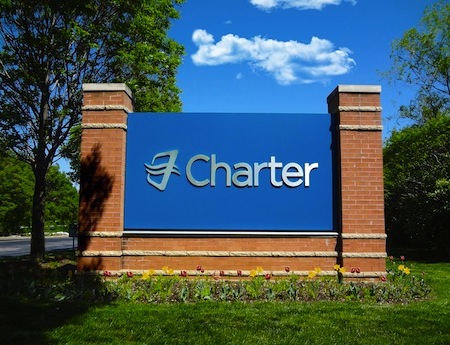Charter Seeking to Charge Video Companies for Interconnection
Cable company petitions FCC to roll back conditions of its Time Warner Cable and Bright House Networks mergers

The smarter way to stay on top of broadcasting and cable industry. Sign up below
You are now subscribed
Your newsletter sign-up was successful
Charter Communications is asking the FCC to terminate the interconnection condition of its deal to acquire Time Warner Cable and Bright House Networks next year — May 18, 2021, two years early — in light of the ”dramatic“ changes in the online video marketplace.
The 2016 conditions were to last seven years, but the Federal Communications Commisssion anticipated such a possible early termination given that it could not anticipate where the competitive market would be that far out.
Currently, Charter must ”offer to interconnect its IP network to any qualifying entity free of charge and on standardized terms.“
The company provided pages of statistics and examples to buttress its argument that over-the-top video will do just fine if Charter is given control of its interconnection deals.
“[T]itans of the video industry, such as Disney and HBO, have begun shifting their programmatic efforts to focus on online delivery,” it said. “By every metric imaginable, OVDs [online video distributors] are seeing record-breaking growth and gains across all performance indicators, including in the number of subscribers, the number of OVD platforms, streaming hours, revenue, and the amount and success of original content on these,” it told the FCC.
"The seven-year term for the Conditions was a ceiling, included to allow the OVD market 'room to become more mature and better positioned to withstand attempts by New Charter to impose data caps and UBP at levels indeed to blunt their competitiveness," it pointed out, adding that the five-year early out trigger was included given that the OVD market might mature before that.
”[I]ndeed, the OVD marketplace has flourished in the four years since the merger closed,” it said. “In fact, far from seeking to harm OVDs, Charter, like many other established broadband providers, is actually actively working to increase its subscribers’ access to online video services. Eliminating these Conditions at the end of five years will therefore advance, rather than thwart the competitive gains that have been made, giving Charter the flexibility it needs to best meet the data usage needs of all of its subscribers and to configure its network to deliver data in the most efficient way possible.”
The smarter way to stay on top of broadcasting and cable industry. Sign up below
Netflix, which had opposed the eventually-scuttled merger of Comcast with Time Warner Cable, supported the Charter-led merger after Charter agreed to extend “settlement-free“ interconnection for the systems it would be acquiring from TWC and Bright House. Netflix reluctantly entered paid interconnection deals with Comcast, TWC, AT&T and Verizon Communications while arguing that such arrangements violated network-neutrality rules.
Charter also wants a similar early exit from its ”no data caps or usage-based pricing“ conditions. The company points out the FCC had said at the time it would entertain such early exits if the marketplace had changed sufficiently.
Charter says the market definitely has changed sufficiently and has petitioned the FCC for the changes.
The FCC said the conditions were to ensure Charter could not “hamper or prevent its current and future online video rivals from expanding, becoming more competitive, or starting up in the first place.”
Charter suggests those rivals hardly need protection from the company given that its rival internet-service providers have not had similar conditions and the OTT marketplace has flourished.
Contributing editor John Eggerton has been an editor and/or writer on media regulation, legislation and policy for over four decades, including covering the FCC, FTC, Congress, the major media trade associations, and the federal courts. In addition to Multichannel News and Broadcasting + Cable, his work has appeared in Radio World, TV Technology, TV Fax, This Week in Consumer Electronics, Variety and the Encyclopedia Britannica.

